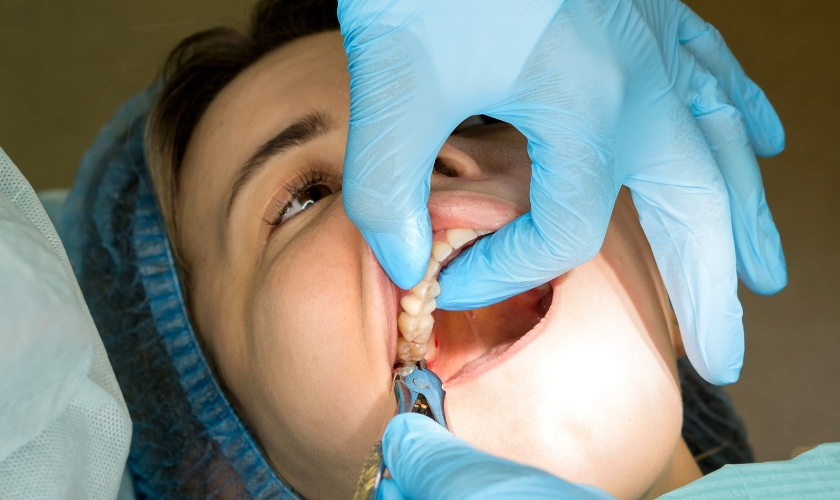How Long Does It Take For A Sinus Cavity To Heal After Tooth Extraction?

Tooth extractions are a common dental procedure, but they can sometimes lead to unexpected discomfort – sinus problems. Our upper jaw is in close proximity to the sinus cavities, and during extraction, particularly of upper molars, the delicate sinus membrane can be involved. This can cause a range of unpleasant symptoms and raise concerns about healing time.
Let’s explore what happens after a tooth extraction when the sinus is involved, the healing process, and how long it typically takes for your sinus cavity to return to normal.
The Relationship Between Teeth and Sinus Cavities
The upper back teeth, known as molars, are located close to the sinus cavities in the skull. When these teeth are extracted, particularly if they have deep roots or are located close to the sinus floor, there is a risk of disturbing the sinus membrane or causing communication between the mouth and the sinus cavity. This can lead to complications such as sinus infections or sinusitis.
Factors Influencing Sinus Cavity Healing
1. Sinus Perforation
During tooth extraction, especially with upper molars, there is a risk of sinus perforation, where the sinus membrane is inadvertently punctured or torn. The healing of a sinus perforation depends on the size of the perforation, the extent of tissue damage, and the body’s healing response. Small perforations may heal on their own with proper post-operative care, while larger perforations may require additional interventions such as sinus augmentation or bone grafting to facilitate healing.
2. Bone Density and Quality
The density and quality of the bone surrounding the extracted tooth can also influence sinus cavity healing. Adequate bone support is essential for promoting optimal healing and preventing complications such as sinus collapse or bone loss. Patients with compromised bone density or quality may require additional treatments to support the sinus floor and promote healing.
3. Patient Health and Habits
The overall health and habits of the patient can significantly impact sinus cavity healing after tooth extraction. Factors such as smoking, compromised immune function, or chronic health conditions can delay healing and increase the risk of complications. Patients with underlying health issues may require closer monitoring and additional interventions to ensure successful healing.
Expected Recovery Timelines
The recovery timeline for sinus cavity healing after tooth extraction can vary depending on several factors, including the complexity of the extraction, the presence of any complications, and individual patient characteristics. In general, most patients can expect the following:
- Immediate Post-Extraction Period: Patients may experience mild to moderate discomfort, swelling, and bleeding immediately following tooth extraction. Pain and swelling typically peak within the first 48 hours before gradually subsiding.
- Sinus Precautions: If a tooth extraction involves the sinus cavity, patients may be advised to take special precautions to prevent complications such as sinus infections or sinusitis. These precautions may include avoiding blowing the nose forcefully, sneezing with the mouth open, or engaging in activities that create pressure changes in the sinus cavity.
- Healing and Resolution of Symptoms: The majority of patients experience significant improvement in symptoms within the first week following tooth extraction. However, complete healing of the sinus cavity may take several weeks to months, depending on the extent of tissue damage and the body’s healing response.
- Follow-Up Appointments: Patients should attend scheduled follow-up appointments with their dentist or oral surgeon to monitor healing progress and address any concerns or complications that may arise.
Post-Extraction Care and Recommendations
Following tooth extraction, patients should adhere to post-operative care instructions provided by their dentist or oral surgeon. This may include:
- Taking prescribed medications: Patients may be prescribed pain medications, antibiotics, or anti-inflammatory drugs to manage pain, prevent infection, and reduce swelling.
- Avoiding strenuous activities: Patients should avoid vigorous physical activities, heavy lifting, or strenuous exercise for the first few days following tooth extraction to minimize the risk of bleeding or complications.
- Maintaining proper oral hygiene: Patients should continue to brush and floss their teeth regularly, taking care to avoid the extraction site until it has healed completely. Rinsing with salt water or a prescribed mouthwash may also help promote healing and reduce the risk of infection.
- Following dietary recommendations: Patients should stick to a soft or liquid diet for the first few days following tooth extraction, gradually reintroducing solid foods as tolerated. Avoiding hot, spicy, or acidic foods can help prevent irritation or discomfort at the extraction site.
Sinus cavity healing after tooth extraction is influenced by various factors, including the complexity of the extraction, the presence of complications, and individual patient characteristics. While most patients can expect significant improvement in symptoms within the first week following extraction, complete healing of the sinus cavity may take several weeks to months. Adhering to post-operative care instructions and attending follow-up appointments is essential for promoting optimal healing and preventing complications. If you have any concerns or experience unusual symptoms during the recovery period, don’t hesitate to contact your dentist or oral surgeon for further evaluation and guidance.

